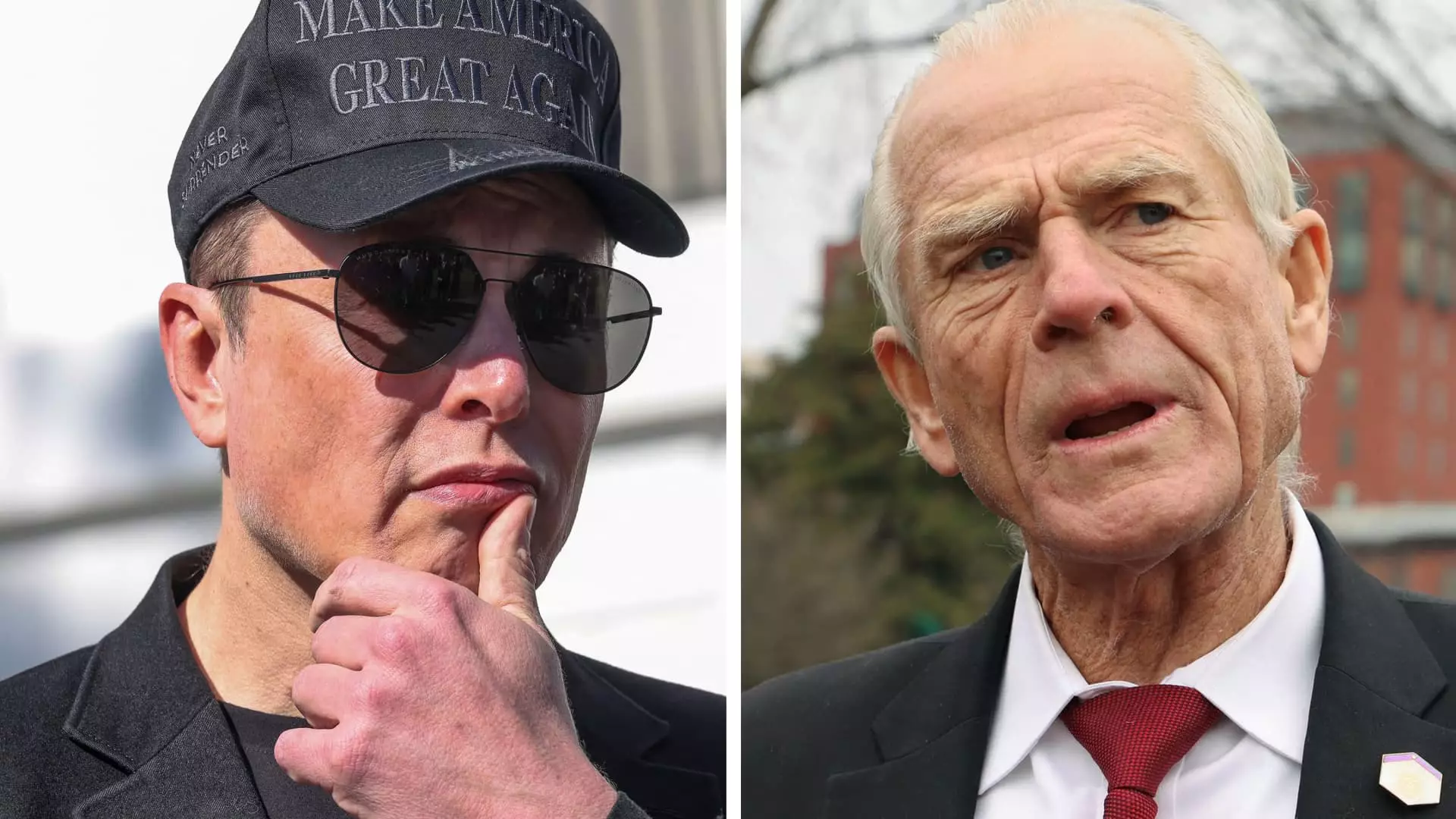In a spectacle reminiscent of a political reality show, Elon Musk’s recent diatribe against Peter Navarro has not only overshadowed the falling fortunes of Tesla but also sparked discussions about trade, tariffs, and the very essence of leadership in America. Musk, a figure known for his sometimes erratic but often visionary leadership, took to social media to unleash a series of venomous remarks directed toward Navarro, who served as President Trump’s trade advisor. At the core of their conflict lies a profound disagreement over tariffs that could alter the economic landscape of American corporations, particularly in the automotive sector.
Musk epitomizes the modern entrepreneur—a man who has scaled the heights of innovation only to find himself entangled in the severe consequences of political machinations. His insistence that Navarro’s credentials are meaningless, branding him “dumber than a sack of bricks,” opens a window into not only personal rivalry but also a larger critique of how academic expertise often fails to translate into practical governance. Musk’s dismissal of established economic theory should serve as a wake-up call that the intersection of business and politics can be fraught with conflict and misunderstanding.
The Price of Tariffs: Consequences for Tesla and Beyond
As tariffs loom large over American businesses, the immediate impact on Tesla is sobering. The company has witnessed a staggering 22% drop in its stock price over the last four trading days—no small feat for a corporation once heralded as a pioneer in electric vehicles. With a declining stock, not only do investors scramble, but the looming tariffs on parts and raw materials threaten to increase production costs significantly. For a company reliant on global supply chains, the irony of a trade advisor advocating for such measures means that Tesla finds itself cornered, grappling with both fiscal distress and a reputation that may be irrevocably tarnished.
Musk’s belief in transforming trade relations, advocating for a zero-tariff framework between Europe and North America, illustrates his commitment to a modernized economic perspective. The constricting tariffs introduced by the Trump administration stand in stark contrast to this vision, raising questions about the wisdom of implementing barriers that could stifle innovation and economic collaboration. With a state-of-the-art facility in Germany and dependencies on international suppliers, Musk’s commitment to fostering free trade is not merely ideological; it is also a calculated business strategy crucial for Tesla’s survival.
The Implications for American Politics
Musk’s outburst against a trusted advisor in the former president’s circle raises eyebrows regarding the inner workings of the administration’s policy-making process. It breeds doubt in the reliability of those who advise on national economic strategy and whether their perspectives are outdated or disconnected from the realities of business today. With the White House’s response labeling the spat as “boys will be boys,” we see an unfortunate normalization of toxic political behavior, where personal feuds overshadow substantive discussions on trade and economic growth.
Moreover, Musk’s blend of political activism and entrepreneurship underscores a critical dichotomy in American politics, especially within the center-right sphere. The clash offers a rare glimpse into how libertarian ideals concerning free markets can at times be at odds with administrative measures perceived as protective or isolationist. By supporting the return of Trump to the White House, Musk finds himself in a tangled web of contradictory values, wrestling with the fallout of an administration that understands his business yet implements policies capable of decimating it.
Reflecting on Leadership and Accountability
The unapologetic nature of Musk’s comments prompts reflection on leadership in today’s chaotic political environment. As the CEO of multiple high-stakes companies, one may argue that Musk should embody the grace and temperance that often elude traditional political figures. Yet, his vocal criticism reflects a deeper frustration—one that resonates with many leaders contending with an increasingly convoluted regulatory system.
In the midst of Musk’s controversies, he remains a polarizing figure. His unfiltered criticism can be seen as both an inherent flaw and a strength, suggesting that perhaps the very fabric of accountability should be reevaluated in American business and politics. As Musk continues to directly challenge prevailing economic narratives, the ongoing tussle between his vision and traditionalist approaches could redefine not only the automotive industry but also how we view the intersection of enterprise and political ideology in a rapidly changing world.

